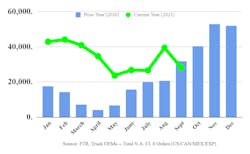Class 8, medium-duty orders fell in September
North American Class 8 net orders for September fell 29% from August to 28,100 units due to the continued global supply chain challenges. According to FTR Intel, September 2021 activity was down 12% since last September with orders now totaling 453,000 units.
The fall in orders came as OEMs are managing their first-quarter production slots in a variety of ways. Some manufacturers continue to enter orders in a measured fashion, filling openings as they become available. Other OEMs are rolling unmet 2021 orders into 2022 and delaying new 2022 bookings. Supply chain disruptions are expected to persist well into 2022, and OEMs are having problems determining how many trucks they will be able to build in Q1 of next year.
“This is a complicated, bizarre situation that OEMs have never before encountered,” said Don Ake, VP of commercial vehicles for FTR. “There are many orders that were expected to be built in 2021 that cannot be completed due to the severe component shortages, most notedly, semiconductors. The OEMs are unsure when they can build the leftover 2021 orders and any new orders because the parts shortages are now expected to continue well into next year. They can’t schedule production because they don’t know their actual build capacity.
“The order number is not a true indicator of 2022 truck demand. There is significant pent-up demand for trucks leftover from 2021 because OEMs were limited in their output. Add to this the robust demand expected for 2022 due to sturdy freight growth. The fleets have a tremendous need for new trucks in 2022, however, the OEMs are delaying entering orders until the supply-chain situation is clearer."
According to Ake, the supply chain remains a huge mess. "Parts and components are so constricted, as well as raw materials, it will take many months to rectify, and conditions are expected to improve gradually, over an extended period."
Medium-duty orders pull back
In addition to the decrease in Class 8 orders, ACT Research reports that medium-duty orders also saw a decline with Classes 5-7 orders dropping to 24,500 units.
“September traditionally marks the transition from the annual summer order trough into fall peak order activity,” said Kenny Vieth, ACT’s president and senior analyst. "However, with demand indicators from freight activity to freight rates and carrier profits in blatant contrast to equipment shortages and capacity constraints across all transportation modes, it is understandable that September’s medium-duty order volume could be construed as disappointing relative to the economic setup.
“It is important to note that it is not demand, but supply that is dictating new order activity, as OEMs are being judicious in fully opening 2022 order books when there is not clear visibility of supply-chain capacity next year,” Vieth concluded. “And, while the story is just starting to develop, recent reports of energy sector issues in China dampen hope for the current supply situation to surprise on the high-side in terms of recovery timing.”
About the Author
FleetOwner Staff
Our Editorial Team
Kevin Jones, Editorial Director, Commercial Vehicle Group
Josh Fisher, Editor-in-Chief
Jade Brasher, Senior Editor
Jeremy Wolfe, Editor
Jenna Hume, Digital Editor
Eric Van Egeren, Art Director

